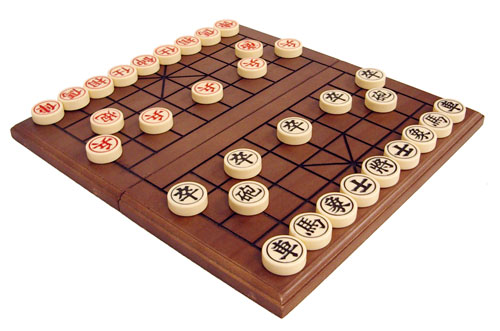Today, people learning about a new culture may look to food, art, history, and language (which is what Cheng & Tsui is all about!). But what about the way a culture plays?
Take a look at the following examples of Chinese board games, and see how having fun is a universal language!
 Xiangqi, Chinese Chess (image source: http://bit.ly/11XG7Mi)
Xiangqi, Chinese Chess (image source: http://bit.ly/11XG7Mi)
Chess, one of the oldest board games played in the West, was likely invented in India around the 6th century A.D., though there are competing theories that the game’s earliest form was invented in China. Xiangqi, or Chinese Chess, is a similar game with a few major differences from the Western version. For one, the pieces are placed on the intersections of the grid in xiangqi rather than on the spaces in so-called ‘International Chess’ (guoji xiangqi). Historians and anthropologists agree that this is likely due to the influence of the game ‘Go’ – perhaps the oldest board game in the world.
Although Chinese Chess remains a mainstay on Chinese sidewalks and living room tables, its Western counterpart has grown in popularity over the last several decades. In fact, the current #2 women’s chess player in the world, Hou Yifan, was born in China’s Jiangsu province. She became the youngest female player to be awarded the title of Grandmaster – the highest title (short of world champion) that a chess player (male or female) can earn. So, to what extent does Hou Yifan owe her chess prowess to the historical crossovers of International Chess with Chinese Chess and Go? “I don’t play Go at all. I maybe know Chinese xiangqi a little. I played Chinese draughts [Chinese Checkers with round glass pieces] and Gobang [also called Gomoku], though, when I was a child. I loved playing Chinese draughts and I’m really good at it.”
 Hou Yifan is a former Women's World Chess Champion, the youngest ever to win the title. (image source from www.whychess.com)
Hou Yifan is a former Women's World Chess Champion, the youngest ever to win the title. (image source from www.whychess.com)
Speaking of Chinese Checkers; it was actually invented in Germany. The name was made up to market the game in America in the early 1900s. Now it is popular in both the U.S., and China – showing how board games can travel the world across cultures.
 Chinese Monopoly (image source: http://bit.ly/SKJZh)
Chinese Monopoly (image source: http://bit.ly/SKJZh)
Recently, popular Western board games have been translated and adapted to fit the lifestyle of the growing leisure class in China: Monopoly, Life, Risk, and even Scrabble are available for purchase in Western style supermarkets and department stores across China.
From East to West and back again, board games have been around for almost as long as the written language. The themes popular in one culture often turn out to have universal appeal, and catch on quickly in new environments. Playing the games of another culture is one of the best ways to learn about it.
To that end, be sure to check out Cheng & Tsui’s Feilong: The China Game. This engaging Trivial Pursuit-style game tests players’ knowledge of Chinese culture across different categories like art, history, and geography!



Comments